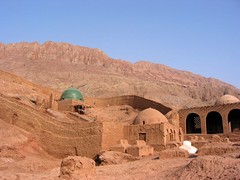I mentioned earlier that Henry Kissinger was either lying about or woefully ignorant of Chinese history and implied that this was due to his personal biases.
Jonathan Mirsky’s review of “Mao: The Untold Story” in the June 2005 issue of the Far Eastern Economic Review (pg 59) contains this quote:
Mr. Kissinger, for instance, was so star-struck by Mao and Zhou Enlai that he committed many indiscretions and security breaches with both of them while serving Nixon.
The previous page also states that Zhou Enlai:
the most attractive man [visiting statesman like Henry Kissinger] had ever met.
For more information on Kissinger’s early negotiations with China, see this article at the National Security Archive at GWU. This article was written in 2002, shortly after a number of relevant records were declassified in mid-2001, so if you think you know the history of US/Chinese diplomacy based on pre-2002 information, you should probably read this article. There are also links to a number of original, formerly classified documents, such as this
These documents also illustrate some differences between Kissinger’s public statements regarding China and Taiwanese policy and his private diplomatic efforts.
As important as this exchange was, in his 1979 memoir Kissinger misleadingly wrote that “Taiwan was mentioned only briefly during the first session.”(5) Yet some 9 pages, nearly 20 percent, of the 46-page record of the first Zhou-Kissinger meeting on 9 July 1971, include discussion of Taiwan, with Kissinger disavowing Taiwanese independence and committing to withdraw two-thirds of U.S. military forces from the island once the Vietnam War ended. Moreover, Kissinger told Zhou that he expected that Beijing and Washington would “settle the political question” of diplomatic relations “within the earlier part of the President’s second term.” Kissinger did not say what that would mean for U.S. diplomatic relations with Taiwan but undoubtedly Zhou expected Washington to break formal ties with Taipei as a condition of Sino-American diplomatic normalization.
This memo from Kissinger to Nixon actually lists Taiwan as the first issue discussed at the Kissinger/Zhou Enlai (spelled Chou here) meeting.
[Page 3]He immediately moved to their fundamental concern, Taiwan, and I rejoined with our position on Indochina.
Some other interesting statements from this particular memo include:
Chou spoke of the Chinese fear of a remilitiarized Japan, and a violently and contemptuously attacked Soviet imperialism, which he claimed had learned its lessons from the U.S.
Clearly China’s current attitude towards Japan is not as divorced from their historical attitudes as some might think.
According to Kissinger’s secret memo to the president, Zhou’s primary themes of discussion were as follows:
the preoccupation with Taiwan; the support for the North Vietnamese; the spectre of big power collusion, specifically of being carved up by the US, USSR, and Japan; the contempt of the Indians, hatred for the Russians and apprehension over the Japanese; the disclaimer that China is, or would want to be, a superpower like the Russians and we who have “stretched out our hands too far”; and throughout the constant view that the world must move toward peace, that there is too much “turmoil under the heavens.”
Most of those are already clear, but the last is particularly interesting. In his recent editorial Kissinger claimed to believe that “Military imperialism is not the Chinese style. China seeks its objectives by careful study, patience and the accumulation of nuances.” I still believe that his understanding of Chinese history is fundamentally wrong, but based on the contents of his 14 July 1971 “Eyes Only” memo to President Nixon-where one would expect total honesty-he actually seems to have believed China’s claims the whole time. The fact that Kissinger believes (and believed) that China’s foreign policy is basically one of peace does not excuse such blatant misinformation as “The Chinese state in its present dimensions has existed substantially for 2,000 years”, but it does perhaps relegate it from sinister propaganda to mere incompetence.




